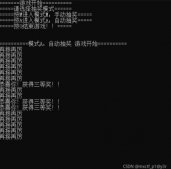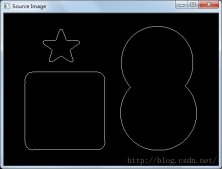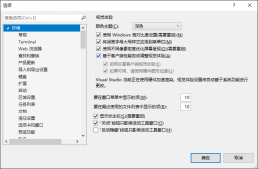for循环语句
重复执行语句,直到条件变为 false。
语法
|
1
2
|
for ( init-expression ; cond-expression ; loop-expression ) statement; |
备注
使用 for 语句可构建必须执行指定次数的循环。
for 语句包括三个可选部分,如下表所示。
for 循环元素

下面的示例将显示使用 for 语句的不同方法。
|
1
2
3
4
5
6
7
8
9
10
11
12
13
14
15
16
17
18
19
20
21
22
23
24
25
26
27
28
29
30
31
32
33
34
35
36
37
38
|
#include <iostream>using namespace std;int main() { // The counter variable can be declared in the init-expression. for (int i = 0; i < 2; i++ ){ cout << i; } // Output: 01 // The counter variable can be declared outside the for loop. int i; for (i = 0; i < 2; i++){ cout << i; } // Output: 01 // These for loops are the equivalent of a while loop. i = 0; while (i < 2){ cout << i++; }} // Output: 012init-expression 和 loop-expression 可以包含以逗号分隔的多个语句。例如:#include <iostream>using namespace std;int main(){ int i, j; for ( i = 5, j = 10 ; i + j < 20; i++, j++ ) { cout << "i + j = " << (i + j) << '\n'; }} // Output: i + j = 15 i + j = 17 i + j = 19 |
loop-expression 可以递增或递减,或通过其他方式修改。
|
1
2
3
4
5
6
7
8
9
10
11
12
|
#include <iostream>using namespace std;int main(){for (int i = 10; i > 0; i--) { cout << i << ' '; } // Output: 10 9 8 7 6 5 4 3 2 1 for (int i = 10; i < 20; i = i+2) { cout << i << ' '; } // Output: 10 12 14 16 18 |
当 statement 中的 break、return 或 goto(转到 for 循环外部的标记语句)执行时,for 循环将终止。 for 循环中的 continue 语句仅终止当前迭代。
如果忽略 cond-expression,则认为其为 true,for 循环在 statement 中没有 break、return 或 goto 时不会终止。
虽然 for 语句的三个字段通常用于初始化、测试终止条件和递增,但并不限于这些用途。例如,下面的代码将打印数字 0 至 4。在这种情况下,statement 是 null 语句:
|
1
2
3
4
5
6
7
8
9
10
|
#include <iostream>using namespace std;int main(){ int i; for( i = 0; i < 5; cout << i << '\n', i++){ ; }} |
for 循环和 C++ 标准
C++ 标准中提到,for 循环中声明的变量将在 for 循环结束后超出范围。例如:
|
1
2
3
4
|
for (int i = 0 ; i < 5 ; i++) { // do something}// i is now out of scope under /Za or /Zc:forScope |
默认情况下,在 /Ze 下,for 循环中声明的变量在 for 循环的封闭范围终止前保持在范围内。
/Zc:forScope 无需指定 /Za 即可启用 for 循环中声明的变量的标准行为。
也可以使用 for 循环的范围差异,重新声明 /Ze 下的变量,如下所示:
|
1
2
3
4
5
6
7
|
// for_statement5.cppint main(){ int i = 0; // hidden by var with same name declared in for loop for ( int i = 0 ; i < 3; i++ ) {} for ( int i = 0 ; i < 3; i++ ) {}} |
这更类似于 for 循环中声明的变量的标准行为,后者要求 for 循环中声明的变量在循环完毕后超出范围。在 for 循环中声明变量后,编译器会在内部将其提升为 for 循环封闭范围中的局部变量,即使存在同名的局部变量也会如此。
基于范围的 for 语句
语句 statement 按顺序反复执行语句 expression 中的每个元素。
语法
|
1
2
|
for ( for-range-declaration : expression )statement |
备注
使用基于范围的 for 语句构造一个必须执行的循环范围,可以定义为任意一个循环访问,例如 std::vector,或者其他任意用 begin() 和 end()定义的范围。命名在 for-range-declaration 语句是属于 for 的,不能在 expression 或 statement中再次声明。请注意 自动 关键字是在 for-range-declaration 中部分语句的首选。
这段代码展示了如何使用 for 范围的循环来遍历数组和向量:
|
1
2
3
4
5
6
7
8
9
10
11
12
13
14
15
16
17
18
19
20
21
22
23
24
25
26
27
28
29
30
31
32
33
34
35
36
37
38
39
40
41
42
43
44
45
46
47
48
49
50
51
52
|
// range-based-for.cpp// compile by using: cl /EHsc /nologo /W4#include <iostream>#include <vector>using namespace std;int main() { // Basic 10-element integer array. int x[10] = { 1, 2, 3, 4, 5, 6, 7, 8, 9, 10 }; // Range-based for loop to iterate through the array. for( int y : x ) { // Access by value using a copy declared as a specific type. // Not preferred. cout << y << " "; } cout << endl; // The auto keyword causes type inference to be used. Preferred. for( auto y : x ) { // Copy of 'x', almost always undesirable cout << y << " "; } cout << endl; for( auto &y : x ) { // Type inference by reference. // Observes and/or modifies in-place. Preferred when modify is needed. cout << y << " "; } cout << endl; for( const auto &y : x ) { // Type inference by reference. // Observes in-place. Preferred when no modify is needed. cout << y << " "; } cout << endl; cout << "end of integer array test" << endl; cout << endl; // Create a vector object that contains 10 elements. vector<double> v; for (int i = 0; i < 10; ++i) { v.push_back(i + 0.14159); } // Range-based for loop to iterate through the vector, observing in-place. for( const auto &j : v ) { cout << j << " "; } cout << endl; cout << "end of vector test" << endl;} |
输出如下:
|
1
2
3
4
5
6
7
|
1 2 3 4 5 6 7 8 9 101 2 3 4 5 6 7 8 9 101 2 3 4 5 6 7 8 9 101 2 3 4 5 6 7 8 9 10end of integer array test0.14159 1.14159 2.14159 3.14159 4.14159 5.14159 6.14159 7.14159 8.14159 9.14159end of vector test |
一个基于 for 循环终止于 statement 执行完成: break, return,或者 goto 转到一个语句外的 for 循环 continue 与语句终止当前 for 循环的迭代。
记住这些关于范围 for 的事实
自动识别数组。
识别那些有 .begin() 和 .end() 的容器。
使用基于自变量的查找 begin() 和 end() 。














